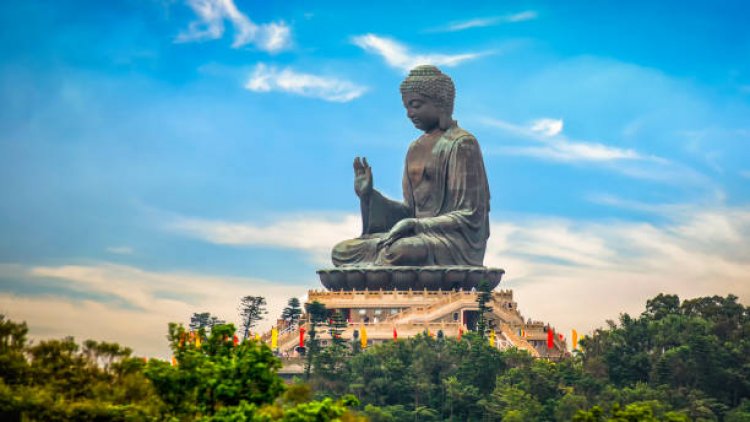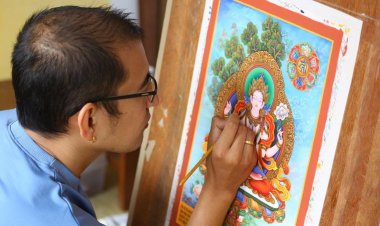Exploring Nepal's Rich Buddhist Heritage: An In-Depth Look into the Country's Spiritual Legacy
Discover the spiritual and cultural richness of Nepal through its Buddhist heritage. This article offers an in-depth exploration of the country's enduring legacy of compassion, non-violence, and wisdom, and how it shapes Nepali society today.

Nepal is a landlocked country located in South Asia, known for its natural beauty and cultural diversity. The country has a rich Buddhist heritage that dates back thousands of years, and it is considered to be one of the most important centers of Buddhism in the world. In this article, we will explore Nepal's Buddhist heritage and take an in-depth look at the country's spiritual legacy.
Buddhism is one of the major religions in Nepal, and it has played a significant role in shaping the country's culture and society. According to historical records, Buddhism was introduced to Nepal in the 3rd century BCE by Emperor Ashoka of India. Ashoka is believed to have sent Buddhist missionaries to Nepal to spread the teachings of Buddhism.
Over the centuries, Buddhism became deeply ingrained in Nepali society, and the country became a hub for Buddhist scholarship and learning. Many of the great Buddhist saints and scholars of the past, such as Padmasambhava and Shantarakshita, lived and taught in Nepal. The country was also a center of artistic and cultural expression, and many of the world's most beautiful Buddhist art and architecture can be found in Nepal.
One of the most significant landmarks in Nepal's Buddhist heritage is the Swayambhunath Stupa, also known as the Monkey Temple. Located in the heart of Kathmandu, the Swayambhunath Stupa is one of the oldest and most sacred Buddhist sites in Nepal. The stupa is believed to have been built over 2,000 years ago and is said to contain relics of the Buddha himself.
Another important Buddhist site in Nepal is the Boudhanath Stupa, located in the eastern part of Kathmandu. The stupa is one of the largest in the world and is a UNESCO World Heritage Site. It is believed to have been built in the 14th century and is an important pilgrimage site for Buddhists from all over the world.
Nepal is also home to several important monasteries and meditation centers. One of the most famous is the Kopan Monastery, located on a hilltop outside of Kathmandu. The monastery was founded in 1969 and is now home to over 300 monks and nuns. It is a center of Buddhist learning and meditation and attracts visitors from all over the world.
In addition to its historical and cultural significance, Buddhism has played an important role in shaping Nepal's modern society. Buddhism emphasizes compassion, non-violence, and the pursuit of wisdom, and these values are deeply ingrained in Nepali culture. Many Nepalis are devout Buddhists and practice meditation and mindfulness as part of their daily lives.
Moreover, Buddhism has played a significant role in promoting social justice and equality in Nepal. Buddhist organizations in Nepal have been at the forefront of promoting women's rights, environmental conservation, and social welfare programs. They have also been active in promoting interfaith dialogue and peacebuilding initiatives.
Despite its rich Buddhist heritage, Nepal's Buddhist community faces several challenges. The country has experienced significant political instability over the past few decades, which has had a significant impact on the Buddhist community. The country's civil war in the 1990s and early 2000s led to the displacement of many Buddhist communities, and the ongoing political instability has made it difficult for many Buddhists to practice their religion freely.
Additionally, Nepal's Buddhist community faces economic challenges. Many monasteries and meditation centers struggle to attract funding, and some are forced to close due to lack of resources. Moreover, many Buddhist communities in Nepal live in poverty, and they lack access to basic necessities such as healthcare and education.
In conclusion, Nepal's rich Buddhist heritage is an integral part of the country's culture and society. Buddhism has played a significant role in shaping Nepal's history, and it continues to be a source of inspiration and guidance for many Nepalis. The country is home to several important Buddhist sites, including the Swayambhunath and Boudhanath stupas, as well as many monasteries and meditation centers. These sites attract visitors from all over the world, and they provide a glimpse into the rich spiritual and cultural traditions of Nepal.
At the same time, Nepal's Buddhist community faces significant challenges, including political instability and economic hardship. The country's civil war and ongoing political struggles have had a significant impact on the Buddhist community, and many struggle to practice their religion freely. Additionally, many Buddhist communities in Nepal live in poverty, and they lack access to basic necessities such as healthcare and education.
Despite these challenges, Nepal's Buddhist community remains resilient and committed to promoting the values of compassion, non-violence, and wisdom. Buddhist organizations in Nepal are active in promoting social justice and equality, and they work tirelessly to improve the lives of people in their communities. They are a testament to the enduring legacy of Buddhism in Nepal and to the power of spiritual traditions to inspire positive change.
Overall, Nepal's rich Buddhist heritage is a testament to the country's enduring cultural and spiritual legacy. It is a source of inspiration and guidance for many Nepalis, and it has played a significant role in shaping the country's history and society. As Nepal continues to navigate its path forward, its Buddhist community will undoubtedly play a key role in promoting social justice, equality, and compassion for all.
What's Your Reaction?





































































































